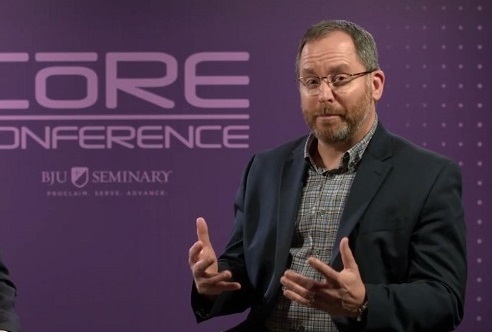Horn: Today, I have the great privilege of being with one of our speakers at our recent CoRE conference—Tim Geiger from Harvest USA. Our CoRE conference was addressing a very important topic. The topic was gender, sexuality, and the church. Tim, I know you’ve done a great deal of thinking about that and as president of Harvest USA. Tell us a little bit about that ministry and maybe how you got involved.
Geiger: Sure. Harvest USA was started 35 years ago by Tenth Presbyterian Church in Philadelphia. We started as an outreach to unchurched gay men in the city, but over the course of time we expanded the ministry. Now we help people struggling with virtually any kind of sexual sin issue. We work with men struggling with heterosexual lust issues. We work with men struggling with same-sex attraction. Women who struggle. Wives of men who struggle. Parents of kids who struggle. Last year we helped over 900 people in our two offices.
Horn: Wow—900 individual people coming into Harvest USA. You’ve been the president for how long?
Geiger: I’ve been the president for two and a half years, and I’ve been with the ministry for 22 years.
Horn: You told in your testimony at our conference—you gave a very compelling story about how you came to Harvest USA. Would you mind telling our listeners about that?
Geiger: Sure, I came to Harvest USA myself back in 1997 as a young man who had been struggling with same-sex attraction for about 20 years. One of the things that complicated that struggle was that I was a Christian all during that time. I felt deeply shameful and deeply guilty and really doubted my salvation. The Lord through a series of remarkable providences brought me to the point where I couldn’t continue in that lifestyle any longer and do it without exploding. So, He brought me to Harvest USA. I began receiving ministries and ministry recipients. I became a volunteer after a couple of years and came on staff a couple of years after that.
Horn: You know the story you gave about that was so compelling because it was a story of God’s grace pursuing you. The theology of the Scripture and the preaching of the Word, coupled with the caring ministry and counseling that you got there, that brought about this great deliverance. In the process of all of that—I was sitting in some of your sessions—you talked about the heart of all of this being idolatry. That was sort of an interesting comment to me, and I’m wondering if you could tease that out a bit here.
Geiger: Sure. A lot of times when we encounter someone struggling with a pattern of sin, whether it’s sexual in nature or not, we tend to address the behavior. We tend to see the bad things that we or someone else does, and we say, “Ok, we just have to get rid of the bad things and everything will be alright.” But that’s not what Scripture says. The real problem—James says in James chapter 1—is that what is behind sin is temptation, and what is behind temptation is this desire in our heart. He doesn’t even call it evil desire; he just calls it desire. The word in Greek he uses is epithumia, and that just means a strong desire.
So, what we’ve found as we’ve ministered to men and women over the past 35 years is that the real things that lead to sexual struggle, whether the struggle is heterosexual or same-sex in nature, the real things behind that are the idols of the heart. And those idols aren’t for sexual things. They are for things like love, affirmation, affection, comfort and control. What we do is we use sex or fantasy as a means to try to satisfy those desires. You can use that model to understand the development of any sin pattern because it’s the same idols that lead to everything. Jesus says that in Matthew 15 and Mark 7.
Horn: So, what you’re talking about, in essence, is a very robust theology of sanctification that grows our heart in Christlikeness and away from the idols that we’ve put up in His place.
Geiger: Definitely. And that’s why the ministry we do at Harvest USA, we don’t call it counseling. We call it discipleship because what we want to do is we want sexual strugglers to not become ex-sexual strugglers; we want them to become fully engaged, fully on-fire people who are in the body of Christ. We want them to fall more deeply in love with Jesus, and learn to live out what Paul says in Romans 2:4, that is that God’s kindness is meant to lead to our repentance.
Horn: I think that was a really important connecting point. It resonated with a lot of people in the conference—myself included. Let me ask a different question. When you said you had 900 people who were helped this past year, that number was stunning to me. It indicates that this is a big problem in the church. How big a problem are we looking at? What’s your sense of the contours of this in the Christian church and in the body of Christ?
Geiger: It is a huge problem, Sam. If you look at some of the statistics, it’s really scary to consider. I don’t know if any of the data out there is really completely foolproof because it depends on people who come clean and admit that they are struggling with some sort of sexual sin pattern. Some of the statistics I threw out in the conference were that 17% of senior pastors look at pornography on a regular basis. About 60% of Christian men admit to looking at pornography on a regular basis. About 17% of Christian women do. And about 57% of Christian teens look at porn on a regular basis.
So, it’s huge numbers of people in the church. If we remain silent in the church and don’t talk about these things, we’re not addressing one of the keys ways in which folks in the church are struggling to implement their faith in life. We’re not meeting them where the struggle is.
Horn: Let me come down on one narrower area that we talked about at the conference. And that’s folks who struggle with same-sex attraction. How can the church do a better job ministering to those people and helping those people in their struggle—in what you just said about becoming better disciples of Jesus Christ.
Geiger: That’s a wonderful question and a question that I really want to help the church become better at living out. I think two things the church can do. One is to invite sexual strugglers, people who struggle with same-sex attraction, to come out of the darkness and into the light by saying this church is a safe place to struggle openly. We want you not to hide your struggle for fear of judgment. We want you to come into the light and struggle well. Scripture tells us—and I think especially of Ephesians chapter 5—that sin that’s kept in the dark has power over us. It controls us.
Horn: It actually flourishes.
Geiger: It does, it does. It’s kind of a juggernaut. It keeps producing a cycle of shame and guilt and fear that keeps you locked in that sin. But if it’s brought into the light, Paul tells us that it actually becomes light. It becomes an opportunity to ultimately give praise to God because of the grace that he shows in giving the grace to walk in repentance. So, churches can encourage people who struggle with all kinds of sexual sin, whether it’s heterosexual or same-sex in nature, to come into the light. We encourage churches to have at least one male individual and one female person for strugglers to talk to. We think men should be ministered to by men and women ministered to by women. Again, just come into the light and be free from these bonds.
But the second thing that we encourage the church to do is to really look at a biblical view and to talk about a biblical view of sex and sexuality and gender. A lot of sexual struggle is tied up in this notion that sex is something that was created for my own pleasure. That’s a very selfish, self-referential take on God’s creation. God actually said that sex and sexuality were created for human flourishing and they were created for mutual encouragement between spouses in a marriage between one man and one woman. They were created for the conception of children. They were created in very dim ways to be analogies of our relationship with Christ. So, for me to take sex and to say I can use this however I want and I can use it for my own pleasure, I’m actually doing violence against God’s created order.
Horn: Tim, you mentioned in your session at the conference that you’re married and you have a daughter—and she’s 15 I think.
Geiger: She’ll be 15 in just a couple days.
Horn: So, you actually had to live this out.
Geiger: I did.
Horn: How did that go for you?
Geiger: It was difficult. I came to Harvest USA, as I said before, as someone who had been struggling with same-sex attraction for a long time. You don’t just go overnight from being a man who thinks about sex with other men and who engages in sex with other men and you have a wonderful, flourishing relationship with your wife. But the Lord gave grace and the Lord continues to give grace for my wife and I to work out what it looks like to see sex and sexuality as a gift from God. And I think as we grow in stewardship of that gift, we give praise to God more and more.
Horn: I think that word stewardship is a very important word in that. Part of the beauty in what God has done in your life is that it gives people hope—that there is, as we grow in grace and as the body of Christ comes alongside in the discipling process, there is great hope in returning to the divine design that God initiated back in Genesis one and two.
Let me ask you this. In your role as the president of Harvest USA, you’ve had to deal with the larger body of Christ and you’ve had to deal with Christians who have embraced the lifestyle of same-sex attraction or gay or lesbian lifestyles. They are actually arguing that that is the way God intended for this to happen. How do you deal with that? How do you effectively speak to those folks?
Geiger: And not just me, but one of the things Harvest does is we try to equip the church to have a voice in these discussions. The most important thing that we can do in the church is to try to build relationships. And not to build relationships in order to fully accept what other folks would say and the other positions they would hold, but to have a relationship where we build mutual respect and mutual trust so that we can have an apologetic dialogue about what Scripture says. The reality is that you can’t believe in the inerrancy of Scripture and then turn around and say, “Well, it’s completely ok to call myself a gay Christian or trans Christian.” I’m not saying that gay or trans people can’t be Christians. I think that as you grow in maturity as a Christian, you have to let go of those identities because they’re not consistent with the way that God has created and redeemed you. They are part of the sin nature. And why would any Christian want to identify with their sin nature? But you can’t get to that point until you have that mutually respectful dialogue with other folks.
Horn: Right, there’s got to be a bridge for that kind of conversation to happen. Tim, you’ve been a great blessing to us and I know to the larger body of Christ. Thank you for what you do. I know that God has raised up ministries like yours because the church is in desperate need of learning how to have this conversation and learning how to deal with this issue as it becomes much more prevalent, even in our own lives and our own congregations. You’re doing a wonderful work, and you’ve certainly been a great blessing here at our conference. Is there a website if there is a pastor maybe listening or a person that would like to get into contact with you or Harvest’s ministry? I’ll let you have the last word.
Geiger: Yeah, you can go to our website, harvestusa.org. We have a whole bunch of free resources on that website, and there are ways for you to get connected if you are someone who is looking for help for yourself or for your family. You can connect with us that way. You can find out how we can help you equip your church to be a safe place for sexual strugglers as well.
Horn: Well, thank you, Tim. And thank you for watching.







